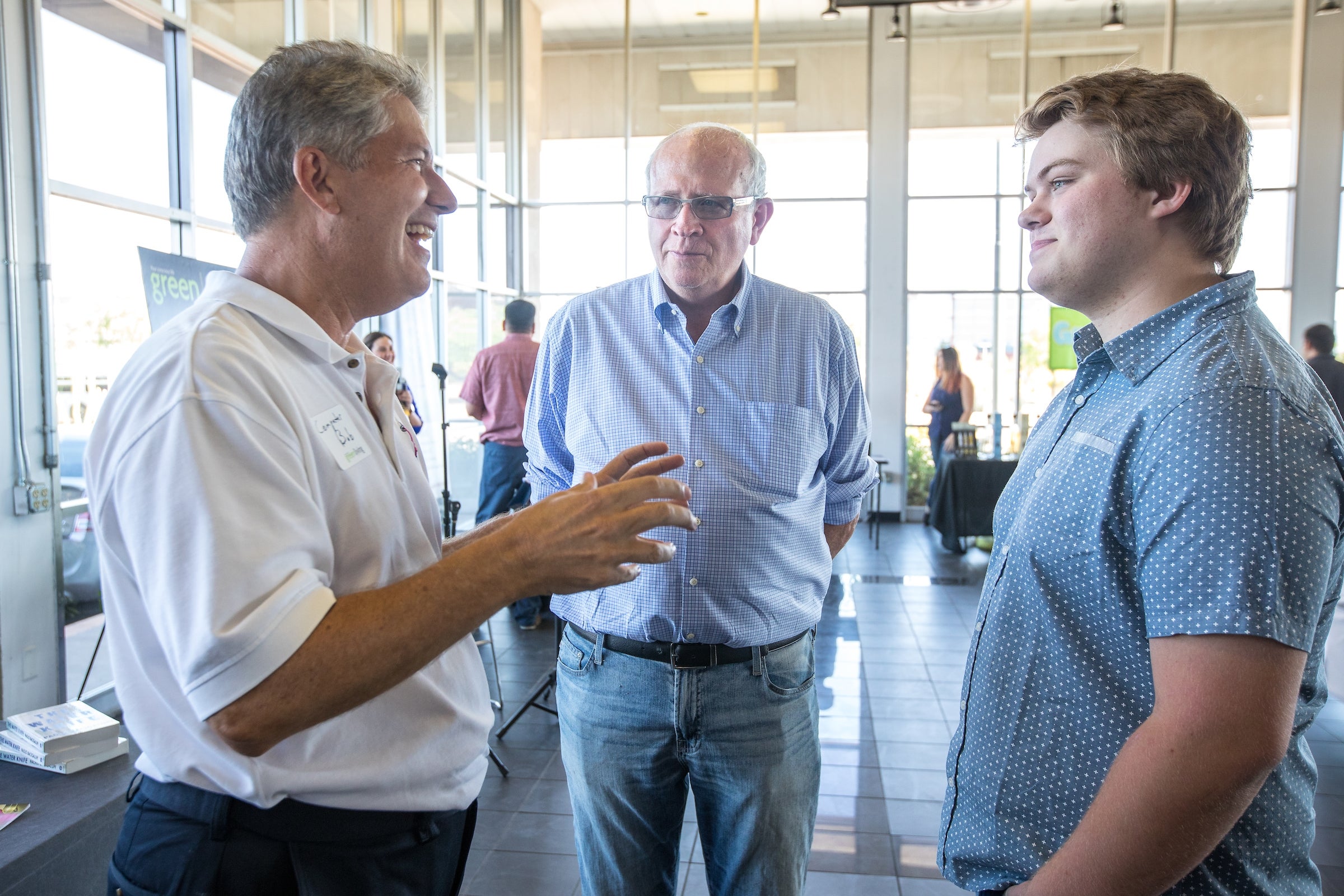ASU sustainability alumnus gears up for cross-country carbon-neutral road trip

To Arizona State University alumnus John Martinson, “range anxiety” — the fear of becoming stranded in an electric vehicle after the battery dies — is a state of mind, not an actual concern.
With a bit of planning, a cross-country road trip in an electric vehicle is possible. And Martinson should know: On July 1, he’s embarking on a monthlong father-son road trip from Arizona to Canada and back in his new Tesla.
Completing an ambitious road trip in an electric vehicle may worry some people, but for Martinson, it’s another way to live his values. Martinson is a recent graduate of the ASU School of Sustainability’s Executive Master of Sustainability Leadership program, and he’s also the school’s alumni board president. Before he graduated from the school, Martinson co-owned the successful China Mist Tea Company for 34 years. He believes in natural capitalism, which is a business model that takes into account the value of earth’s natural resources and ecosystems.
Martinson and his 17-year-old son, Neo, will share driving of the Tesla Model 3, which advertises up to 310 miles of range. (For reference, Phoenix to Los Angeles is about 370 miles.)
Deciding on the route was easy for Martinson — and none of it had to be determined by the location of charging stations: “The Tesla charging infrastructure covers everywhere I wanted to go,” he said.
Their 6,000-mile-plus route winds through several states and two countries, where the father-son pair will check out national parks and visit friends and family.
After deciding on the destinations, Martinson “started looking for scenic and challenging roads to make the trip more fun,” since they didn’t just want to drive major highways. Martinson wants to prove that off-the-beaten-path areas can be reached in an electric vehicle.
Martinson most looks forward to driving the scenic Going-to-the-Sun Road through Glacier National Park in Montana and the Icefields Parkway from Banff to Jasper in Canada. Neo Martinson recently earned a private pilot certificate — with the intent to eventually earn a commercial pilot certificate — and is excited to fly small planes at a couple locations where he and his dad will have time to take to the skies.
But the trip isn’t all for fun; Martinson is ready to put into practice the knowledge he learned at the School of Sustainability.
“(The trip) gives me an opportunity to demonstrate these principles to my son and to others we meet on the road, and promote the Rocky Mountain InstituteThe Rocky Mountain Institute and the School of Sustainability are primary partners of the journey. and the ASU School of Sustainability and their many programs to various audiences along the way,” he said. But the trip isn’t all for fun; Martinson is ready to put into practice the knowledge he learned at the School of Sustainability.
It’s important to Martinson that his trip is carbon neutral. Though the Tesla Model 3 doesn’t burn fuel, the production of electricity emits carbon dioxide, a greenhouse gas that contributes to climate change. To counter these pollutants, Martinson will purchase carbon offset credits from Carbon Fund, an organization that supports vetted projects worldwide that help reduce carbon emissions. He’s letting the ASU sustainability community decide, via a social media poll, which carbon offset project to support: energy efficiency, forestry or renewable energy.
Datu Buyung Agusdinata, a professor and senior sustainability scientist at the Julie Ann Wrigley Global Institute of Sustainability, said that alternative forms of transportation are important for society to adopt.
In 2016, “about 28 percent of all greenhouse gas emissions in the United States were from transportation, mostly passenger cars, because 90 percent of auto fuels were fossil fuels — gasoline and diesel,” Agusdinata said. “Fossil fuel burning is also responsible for bad air quality, which negatively impacts human health.”
Agusdinata said society is slow to adopt electric vehicles because they are unfamiliar territory and there are concerns including limited driving range, higher vehicle purchase prices and sustainability of electricity sources. He expects that advances in technology will decrease the cost of electric vehicles and increase their range
Martinson wants to serve as inspiration for others who are considering an electric vehicle and alleviate their concerns regarding range through blogging, collecting data, delivering presentations and connecting with people on the road. And he wants to do ASU proud.
“It has been my great honor to have graduated from ASU and now to be able to give back,” Martinson said.
He will be presenting at School of Sustainability alumni and online-student events in Seattle on July 21 and Mountain View, California, on July 25. His Tesla is wrapped and features the school’s logo.
To learn more about Martinson's journey and to follow along, visit his road trip website teslaroadtrip.blog.
Top photo: John Martinson, School of Sustainability alumnus and China Mist co-founder (left), shows off the Tesla Model 3 that he and his 17-year-old son, Neo, will drive on their 30-day, 6,000-mile road trip of the West, to Steve Kellogg at the Autowits car dealership in Scottsdale on June 27. Photo by Charlie Leight/ASU Now
More Environment and sustainability

New study on Arctic’s ‘Last Ice Area’ highlights the urgency for reducing warming
The Arctic’s “Last Ice Area” — a vital habitat for ice-dependent species — might disappear within a decade after the central Arctic Ocean becomes ice-free during summer, which is expected…

ASU fire expert Stephen Pyne on learning to live alongside fire
Stephen Pyne is having a busy retirement. On top of caring for chickens, sheep and citrus on his urban farm in Queen Creek, Arizona, the Arizona State University professor emeritus is being called on…

New interdisciplinary research highlights wildfire impacts on water and ecosystems in arid regions
As wildfires increasingly threaten arid regions, a new conceptual framework developed by a team of researchers offers a fresh perspective on the relationship between fire, water quality and ecosystem…


